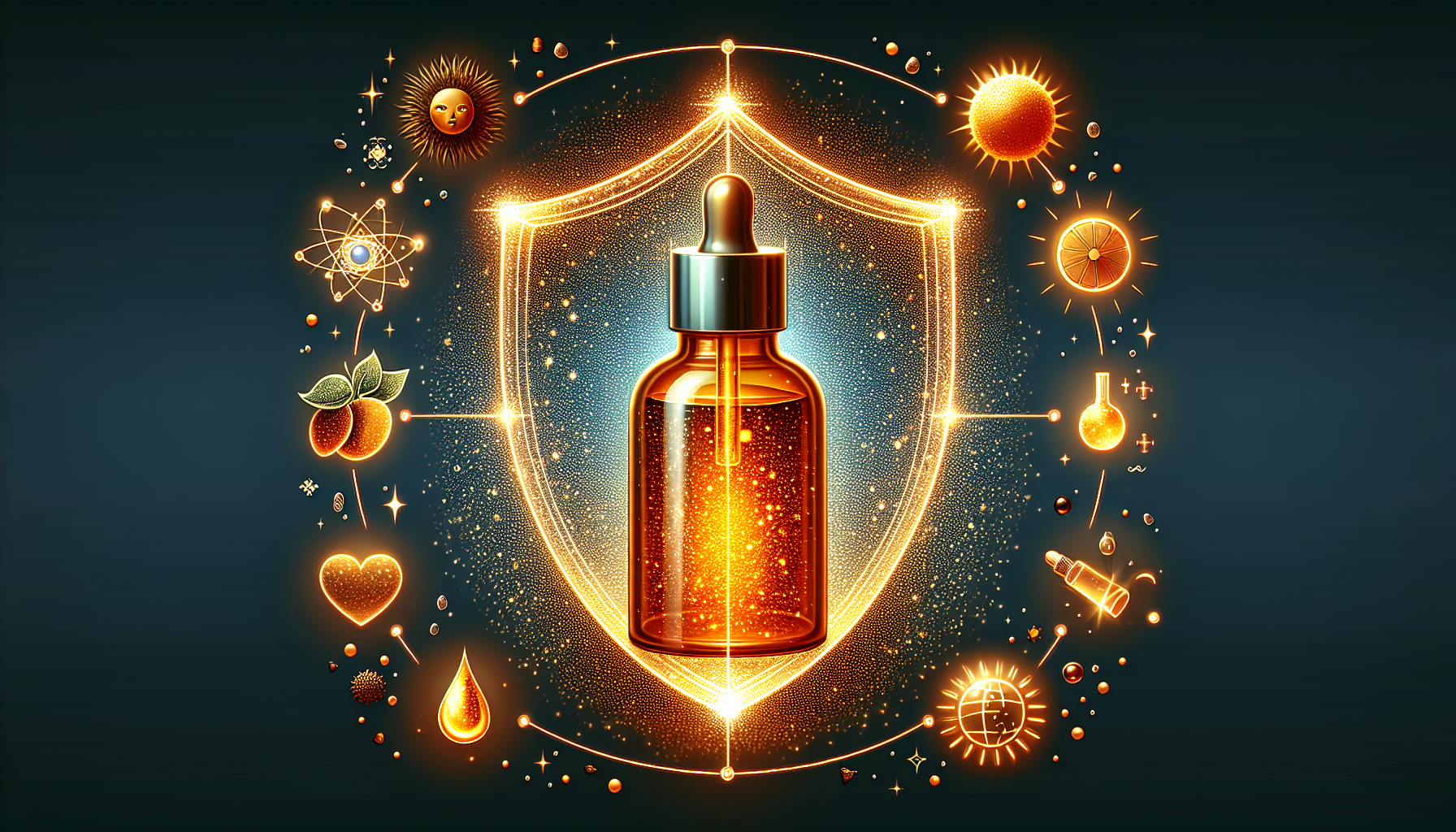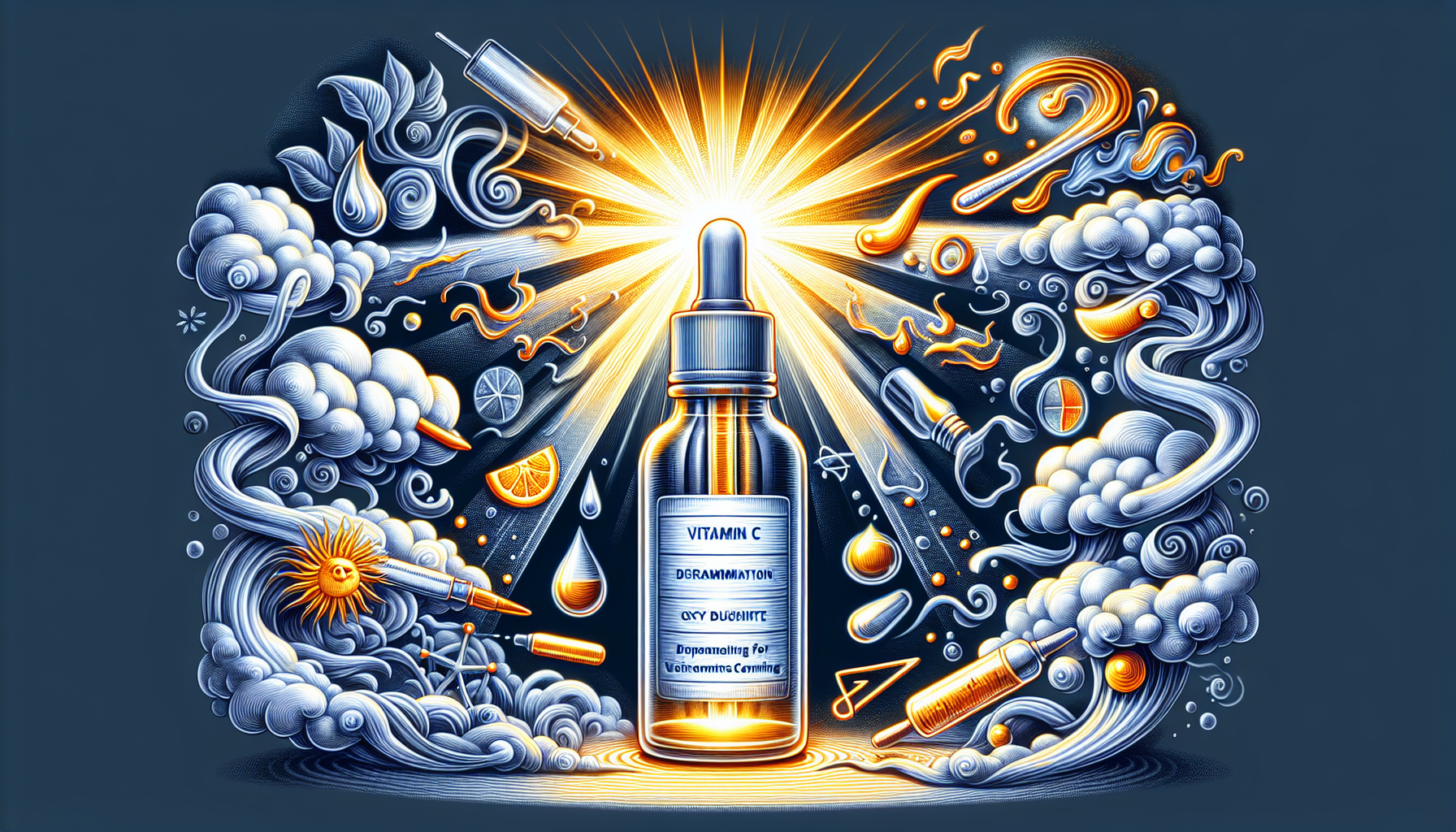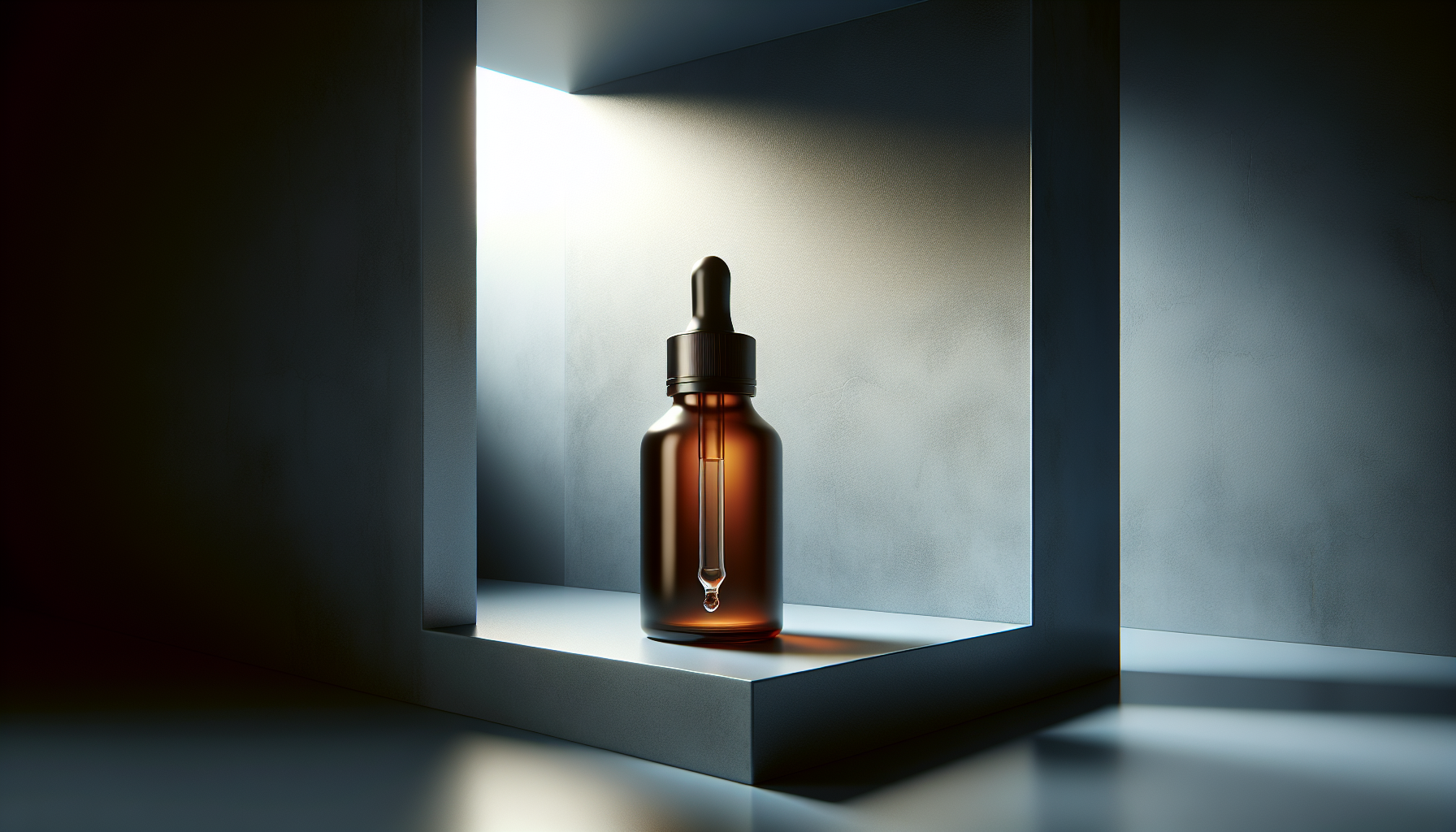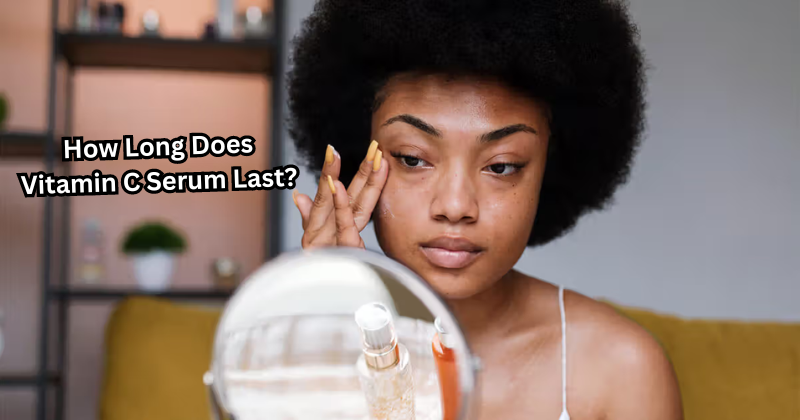Wondering how long does vitamin C serum last? Unopened, it can stay potent for up to three years. Once opened, it typically lasts 3 to 6 months. This guide will help you make the most of your serum with tips on storage and handling.
Key Takeaways
- Vitamin C serum loses its potency due to oxidation, with active ingredients degrading by 40% within 8 weeks of opening.
- Proper storage in a cool, dark place and minimizing exposure to air and light are essential to prolong the shelf life of vitamin C serum.
- Signs of expired vitamin C serum include changes in color, scent, and texture, indicating it is no longer effective and should be discarded.
How Long Does Vitamin C Serum Last? Essential Tips to Maximize Shelf Life
Knowing the shelf life of vitamin C serum helps to uphold its potency and effectiveness. From the moment you open a bottle of vitamin C serum, the clock starts ticking on its effectiveness.
On day one, the concentration of active ingredients can already be 30% lower than the brand’s claim due to oxidation, a natural chemical reaction that occurs over time. Over the course of 8 weeks, the active ingredients degrade by an average of 40%.
You should comprehend how oxidation impacts the potency of your vitamin C serum to maximize its shelf life. Oxidation is the process where the active ingredients in the serum react with oxygen, causing them to break down and lose their effectiveness. This degradation can happen quickly, with a significant drop in potency occurring within just a few weeks.
Proper storage and handling are necessary to preserve the potency of your vitamin C serum. By following essential tips such as storing your serum in a cool, dark place and minimizing exposure to air and light, you can significantly extend its shelf life and ensure that your skin reaps the maximum benefits from this powerful antioxidant.
Introduction

Vitamin C serum is a skincare essential known for its remarkable ability to protect against sun damage, brighten the complexion, and reduce the appearance of fine lines and wrinkles. However, this powerhouse ingredient is highly unstable and can lose its effectiveness if not stored properly. Grasping the shelf life of vitamin C serum ensures you get maximum value from your skincare investment.
Exposure to light, including uv exposure, air, and heat can cause vitamin C serum to oxidize, leading to a decrease in its potency and benefits.
By learning how to store and handle your vitamin C serum correctly, you can protect its delicate formula and maintain its texture and efficacy. This guide will provide you with the knowledge and tips you need to keep your vitamin C serum effective and your skin glowing.
Understanding the Shelf Life of Vitamin C Serum

Several factors, such as its formulation and storage conditions, influence the shelf life of vitamin C serum. Here are some key points to keep in mind:
- Freshly manufactured vitamin C serum often has a watery consistency and a cloudy appearance.
- As it ages, vitamin C serum undergoes changes that can affect its potency and effectiveness.
- On average, the active ingredients in vitamin C serum degrade by 40% within 8 weeks.
Oxidation is a natural chemical reaction that occurs over time, regardless of how stabilized the vitamin C formula may be. This means that even if you store your serum perfectly, it will still degrade over time due to free radical damage. Comprehending these changes and their impact on your serum’s potency is vital to leverage its benefits for a healthy, radiant skin.
Unopened Vitamin C Serum
When stored properly, unopened vitamin C serum can maintain its potency for up to three years, although the typical shelf life ranges from 6 to 12 months. Factors such as air, light, and heat can affect the shelf life of unopened vitamin C serum, so it’s important to store it in a cool, dark place to preserve its effectiveness.
If you store your unopened vitamin C serum away from direct sunlight and high temperatures, its shelf life will be extended, and it will remain effective when you need to use it. Proper storage is key to maintaining the integrity of the active ingredients and maximizing the benefits for your skin.
Opened Vitamin C Serum
Once opened, the shelf life of vitamin C serum typically ranges from 3 to 6 months, depending on the brand and storage conditions. Some brands claim that their serums can last up to a year after opening, but the general consensus is that vitamin C serums are most effective within the first few months of opening.
The color of the serum may change to a champagne or straw-colored hue over time, which is normal and does not necessarily indicate that the serum has gone bad. However, it’s important to monitor any significant changes in color, scent, or texture, as these can be signs that the serum is no longer effective.
Factors Affecting the Potency of Vitamin C Serum
Several external factors can influence the stability and potency of vitamin C serum, including:
- Light
- Air
- Heat
- Humidity
Exposure to these elements can accelerate the degradation of the active ingredients, reducing the effectiveness of the serum over time. Comprehending these factors is key to preserving your vitamin C serum’s potency and enabling your skin to benefit from its potent antioxidant properties.
Factors that can destabilize vitamin C serum and reduce its effectiveness include:
- Light exposure
- Exposure to air and oxygen
- High temperatures
- Humidity levels
It is important to store vitamin C serum in a cool, dark place to prolong its shelf life.
Light Exposure

Exposure to sunlight can oxidize the vitamin C in the serum, rendering it ineffective. This is why it’s crucial to use dark, opaque bottles for storage, as they help protect the serum from light exposure and maintain its potency. Light causes the vitamin C to degrade, leading to a loss of its antioxidant properties and reducing its effectiveness.
Dark-colored bottles make it difficult for light to penetrate and degrade the vitamin C content, ensuring that the serum remains effective for a longer period. By storing your vitamin C serum in a dark, opaque bottle, you can protect it from light exposure and maximize its benefits for your skin.
Air and Oxygen
When vitamin C serum is exposed to air, it undergoes oxidation, leading to a reduction in its effectiveness. This is why it’s important to minimize air exposure by ensuring that the cap is securely sealed after each use.
Furthermore, using serums with airtight pumps can help prevent exposure to air and prolong the shelf life of the serum.
Heat and Humidity
Heat and humidity can accelerate the degradation of vitamin C serum, reducing its potency and effectiveness. Exposure to high temperatures can break down the active ingredients in the serum, diminishing its beneficial properties. Similarly, high humidity levels can impact the stability of the serum, leading to quicker spoilage.
Storing your serum in a cool, dry place can help maintain its potency and prolong its shelf life.
Signs Your Vitamin C Serum Has Gone Bad
Recognizing the signs that your vitamin C serum has expired is key to guarantee that you’re using a potent product. Here are some signs to look out for:
- Change in color: If your serum turns yellow, brown, or orange, it has most likely oxidized and lost its effectiveness.
- Change in scent: An off smell can indicate that the serum is no longer effective and should be discarded.
- Change in texture: If you notice a change in texture, such as clumping or separation, it may be a sign that the serum has degraded and is no longer effective.
If you notice any of these signs, it’s best to discard the serum and replace it with a fresh one.
It’s important to pay attention to these signs to avoid using a degraded product that may not provide the desired benefits for your skin. Regular checks on the color, scent, and texture of your vitamin C serum guarantee that you’re using an effective and potent product.
Color Changes
Color changes are one of the most obvious signs that your vitamin C serum has gone bad. An oxidized serum that was originally transparent may turn yellow, amber, or even orange. These changes indicate that the serum has degraded and is no longer effective. If you notice that your serum has turned completely yellow, brown, or orange, it’s time to discard it and get a new bottle.
These color changes are a result of the oxidation process, which causes the active ingredients in the serum to break down and lose their potency. Keeping track of your serum’s color helps to ensure that the product you’re using is still beneficial and effective for your skin.
Scent and Texture Alterations
Changes in scent and texture can also indicate that your vitamin C serum has gone bad. If your serum develops an off smell or the texture becomes grainy or separates, it’s a sign that the product has degraded.
When the oil and cream within the formula separate, it can affect the serum’s efficacy and potentially cause irritation when applied to the skin.
Expiration Date
Noting the expiration date on your vitamin C serum is vital for guaranteeing its effectiveness. The expiration date signifies the period during which the product is expected to remain effective. Most vitamin C serums have a PAO (period after opening) symbol on the packaging, indicating the recommended time frame for use after opening.
By adhering to the expiration date, you can ensure that you’re using a potent and effective product.
Best Practices for Storing Vitamin C Serum
Correct storage of vitamin C serum is vital for maintaining its effectiveness and extending its shelf life.
By following best practices for storage, you can protect the serum from factors that can degrade its potency, such as light, air, and heat. Storing your serum in a cool, dark place and using airtight packaging are key to preserving its integrity.
Storing vitamin C serum in the refrigerator can help maintain its potency by preventing degradation from light and heat exposure. Additionally, using dark, opaque bottles and minimizing air exposure can further extend the shelf life of your serum and ensure that it remains effective for longer.
Adopting these best practices helps to enhance the benefits of your vitamin C serum and maintain your skin’s youthful appearance.
Use Dark, Opaque Bottles
One of the simplest yet most effective ways to protect your vitamin C serum is by using dark, opaque bottles. Packaging in dark or opaque bottles helps maintain the potency of the serum by shielding it from light exposure. Light can degrade the vitamin C content, causing it to lose its effectiveness.
Using dark, opaque bottles protects your serum from light exposure, ensuring its potency and effectiveness for a prolonged period.
Store in a Cool, Dark Place

Storing your vitamin C serum:
- Keep it in a cool, dark place
- Avoid extreme temperatures
- Refrigerate or find another cool, dark location
- Prevent oxidation
- Prolong the shelf life of the product
This practice upholds the integrity of the active ingredients and guarantees that your serum stays effective for an extended period.
Minimize Air Exposure
Minimizing air exposure is another important step in preserving the potency of your vitamin C serum. Exposure to air can result in oxidation, leading to a loss in the serum’s effectiveness. To prevent this, always make sure the cap is tightly sealed after each use.
Additionally, consider using serums with airtight pumps or airless pump bottles to minimize air exposure and prolong the shelf life of the product.
Alternative Forms of Vitamin C

While traditional vitamin C serums are popular, there are alternative forms of vitamin C that offer increased stability and effectiveness.
Vitamin C powders and magnesium ascorbyl phosphate are two such alternatives that have gained attention for their ability to retain potency for longer periods. These alternatives can offer comparable benefits without the swift degradation seen in liquid serums.
Vitamin C powders, for example, are less prone to oxidation compared to liquid forms, making them a more stable option. Similarly, magnesium ascorbyl phosphate is known for its excellent stability and reduced likelihood of causing skin irritation compared to pure L-ascorbic acid. By exploring these alternative forms, you can find a vitamin C product that best suits your skincare needs and preferences.
Vitamin C Powders
Vitamin C powders are a fantastic alternative to traditional serums, offering enhanced stability and longevity.
Unlike liquid forms, powdered vitamin C retains its benefits better and is less prone to oxidation. This makes it a more reliable option for those looking to maintain the effectiveness of their pure vitamin C product over time.
Using vitamin C powders is simple and versatile. You can mix the powder with your favorite moisturizer or serum to create a customized skincare product tailored to your specific needs. This flexibility allows you to enjoy the benefits of vitamin C without worrying about rapid degradation or reduced potency.
Magnesium Ascorbyl Phosphate
Magnesium ascorbyl phosphate is another stable and effective form of vitamin C used in skincare.
This derivative is known for its excellent stability in both water-based and oil-based formulations, making it a versatile option for various skincare products, including those containing vitamin e.
Additionally, magnesium ascorbyl phosphate is less likely to cause skin irritation compared to pure L-ascorbic acid, making it suitable for sensitive skin types.
Incorporating Vitamin C into Your Skincare Routine
Incorporating vitamin C into your skincare routine can provide numerous benefits, including:
- Brightening your complexion
- Protecting against sun damage
- Combatting free radicals
- Stimulating collagen production
- Improving overall skin tone
Vitamin C serum is a skincare essential known for its ability to provide these benefits. To maximize its effectiveness, it’s important to apply vitamin C serum correctly and layer it with other skincare products appropriately.
For most skin types, the best time to apply vitamin C serum is in the morning after cleansing and toning, but before moisturizing and applying sunscreen. This allows the serum to protect your skin from environmental damage throughout the day. If you have sensitive skin, you may prefer to apply vitamin C serum at night to avoid potential redness and sunburn. Understanding optimal application and layering practices ensures your vitamin C serum provides the best results.
Application Timing
The timing of your vitamin C serum application can significantly impact its effectiveness.
For most skin types, applying vitamin C serum in the morning after cleansing and toning is ideal, as it helps protect the skin from environmental damage throughout the day. However, if your skin is sensitive, you may find it beneficial to apply the serum at night to avoid potential irritation and sunburn.
Knowing when to apply vitamin C serum, based on your skin type, can assist in achieving optimal results.
Layering with Other Products
Layering vitamin C serum with other skincare products is essential for maximizing its benefits. Due to its water-soluble nature, vitamin C serum should be applied first, followed by oil-based products. This ensures that the serum is absorbed effectively into the skin.
Additionally, applying vitamin C serum in the morning and retinol at night can help avoid potential irritation and maximize the benefits of both products.
Summary
Understanding the shelf life and proper storage of vitamin C serum is crucial for maintaining its potency and effectiveness.
By recognizing the signs of degradation, such as color changes, scent, and texture alterations, you can ensure that you’re using a potent product that delivers the desired benefits. Proper storage practices, including using dark, opaque bottles and minimizing exposure to light, air, and heat, can significantly extend the shelf life of your serum.
Exploring alternative forms of vitamin C, such as powders and magnesium ascorbyl phosphate, can provide more stable options that retain their potency for longer periods.
Incorporating vitamin C into your skincare routine with the right application timing and layering techniques can enhance your skin’s protection and repair, resulting in a radiant and healthy complexion. By following these guidelines, you can maximize the benefits of vitamin C serum and keep your skin glowing.
Frequently Asked Questions
How long does vitamin C serum last once opened?
Vitamin C serum typically lasts 3 to 6 months once opened, depending on the brand and how it's stored. It's important to use it within this timeframe for maximum effectiveness.
What are the signs that my vitamin C serum has gone bad?
If your vitamin C serum has changed color to yellow, brown, or orange, has a different scent, or has an altered texture, it may have gone bad. Be cautious of using it on your skin.
How should I store my vitamin C serum?
You should store your vitamin C serum in a cool, dark place, preferably in a refrigerator, to protect it from light exposure and preserve its effectiveness.
Can I use vitamin C serum if it has turned yellow?
No, if the vitamin C serum has turned completely yellow, brown, or orange, it has likely oxidized and lost its potency. It's best to discard it.
Are there more stable alternatives to traditional vitamin C serums?
Yes, vitamin C powders and magnesium ascorbyl phosphate are stable alternatives to traditional vitamin C serums, retaining their potency for longer periods.

